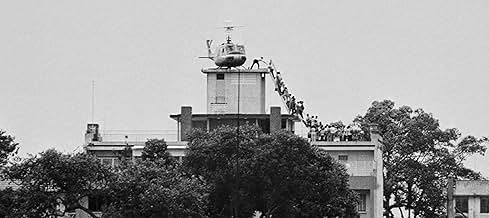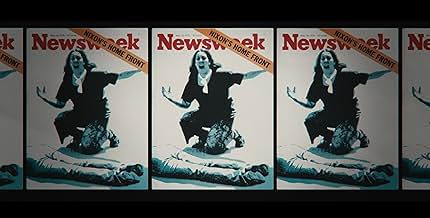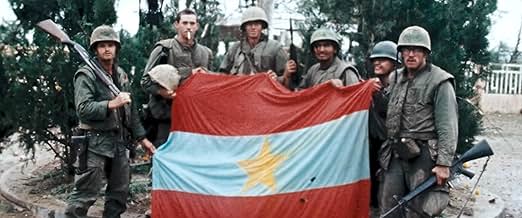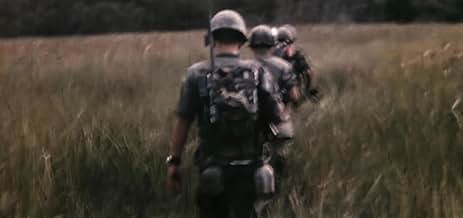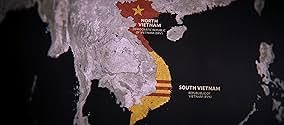Punto de inflexión: La guerra de Vietnam
Título original: Turning Point: The Vietnam War
- Miniserie de TV
- 2025
- 1h 15min
Los profundos efectos de la guerra de Vietnam en la identidad estadounidense, que provocan divisiones sociales y erosionan la confianza del gobierno. Más que una derrota militar, transformó ... Leer todoLos profundos efectos de la guerra de Vietnam en la identidad estadounidense, que provocan divisiones sociales y erosionan la confianza del gobierno. Más que una derrota militar, transformó la política y la cultura estadounidenses.Los profundos efectos de la guerra de Vietnam en la identidad estadounidense, que provocan divisiones sociales y erosionan la confianza del gobierno. Más que una derrota militar, transformó la política y la cultura estadounidenses.
Explorar episodios
Opiniones destacadas
After Ken Burns' magisterial and monumental 18-hour deep dive into the Vietnam War, you'd think there'd be nothing left to say. But "Turning Point: The Vietnam War" on Netflix proves there's still room for new voices, especially from both North and South Vietnam, that bring fresh, essential perspectives to this complex and chaotic chapter of history. The series is balanced, detailed without dragging, and as harrowing as any account of America's decades-long misadventure. Fifty years after the fall of Saigon, this story remains urgent and deeply unsettling. Like Brian Knappenberger's earlier "Turning Point" series on 9/11 and the Cold War, it's clear-eyed, unflinching, and committed to telling the truth, warts and all. It's definitely a worthy watch.
Therefore the first question will be: is it worth to watch?
To make it short: Yes, today more than some years ago It is of course primarily from an US point of view, in spite of several Vietnamese interview partners.
Does it miss possibly important details as some critics here argue? Most likely as all major conflicts have deeper roots and more sideways as you have footage to make a documentary about, but IMHO the series provides such a plethora of footage that most of us will see something new and disturbing.
The Vietnam War, as many conflicts before and afterward are presented as an array of conflicting political and military decisions, when in the end they are just killing humans on both sides for no reason. 50 years from now we'll see a similar documentary about the Ukraine, if free speech is still possible.
To make it short: Yes, today more than some years ago It is of course primarily from an US point of view, in spite of several Vietnamese interview partners.
Does it miss possibly important details as some critics here argue? Most likely as all major conflicts have deeper roots and more sideways as you have footage to make a documentary about, but IMHO the series provides such a plethora of footage that most of us will see something new and disturbing.
The Vietnam War, as many conflicts before and afterward are presented as an array of conflicting political and military decisions, when in the end they are just killing humans on both sides for no reason. 50 years from now we'll see a similar documentary about the Ukraine, if free speech is still possible.
There have been many excellent TV/streaming series on the Vietnam War and this is another. To be clear, the big events of the war, especially from the years 1965 to 1973 were amply addressed by the other series and the only thing different about this one is some of the interviewees are new.
Where the series adds something new is at the beginning and end of the conflict. The description of the early 20th century developments and the Kennedy years contained some material I don't remember from other series. Ditto for the period after the Paris Peace Treaty. For example, a representative of the Communists admitted they went too far in their postwar purge of the former South Vietnam. I don't remember the other series showing expressions of doubt or regret by the Communists. I think this speaker's regrets could be expressed more freely because relations between the US and Vietnam are so much better today.
Finally, I'm a little surprised that other reviewers suggest the series only shows the American perspective, the series interviews many Vietnamese from both sides of the conflict. While I think the series is perhaps it little more generous to some American critics of the war then they should have been, I don't get the criticism of Dan Rather's inclusion. He was covering the war throughout the entire period of heavy American involvement. He is certainly very critical of the effort in retrospect, but I suspect he was like Walter Cronkite and millions of other Americans in thinking it began as a noble cause.
Where the series adds something new is at the beginning and end of the conflict. The description of the early 20th century developments and the Kennedy years contained some material I don't remember from other series. Ditto for the period after the Paris Peace Treaty. For example, a representative of the Communists admitted they went too far in their postwar purge of the former South Vietnam. I don't remember the other series showing expressions of doubt or regret by the Communists. I think this speaker's regrets could be expressed more freely because relations between the US and Vietnam are so much better today.
Finally, I'm a little surprised that other reviewers suggest the series only shows the American perspective, the series interviews many Vietnamese from both sides of the conflict. While I think the series is perhaps it little more generous to some American critics of the war then they should have been, I don't get the criticism of Dan Rather's inclusion. He was covering the war throughout the entire period of heavy American involvement. He is certainly very critical of the effort in retrospect, but I suspect he was like Walter Cronkite and millions of other Americans in thinking it began as a noble cause.
There is no new insight here, and if you're familiar with the Ken Burns series, this is the lackluster remake. It duly covers the various turning points, from French loss to Tet to scuttled peace talks and Nixon's genocidal campaigns to name a few. We get various asides along the way; the student anti-war movement, the elections of '68, the treatment of returning veterans.
If it's your first comprehensive surveying of the Vietnam story, you will get the whole thing. It is, as usual, told from the American perspective; ill-advised entanglement in a faraway jungle, increasingly bitter and chaotic. There are also some Vietcong voices this time around.
There's so much that went wrong in a decade that to survey as we do, with talking heads, and condensing to snippets, makes it seem self-evident. There's no way to tell what a world would look like in which the CIA didn't lose the plot probably starting with Cuba, for example, or 'domino effect' thinking didn't win over in policy circles. And it's important to note how badly Washington misunderstood context; the generals did really think in terms of fighting in the Pacific Theater, but there the troops had been propelled by Pearl Harbor and fighting the good fight.
If it's your first comprehensive surveying of the Vietnam story, you will get the whole thing. It is, as usual, told from the American perspective; ill-advised entanglement in a faraway jungle, increasingly bitter and chaotic. There are also some Vietcong voices this time around.
There's so much that went wrong in a decade that to survey as we do, with talking heads, and condensing to snippets, makes it seem self-evident. There's no way to tell what a world would look like in which the CIA didn't lose the plot probably starting with Cuba, for example, or 'domino effect' thinking didn't win over in policy circles. And it's important to note how badly Washington misunderstood context; the generals did really think in terms of fighting in the Pacific Theater, but there the troops had been propelled by Pearl Harbor and fighting the good fight.
I have been a Netflix subscriber for years and years and this has to be the best documentary I have ever seen. It is so thoughtful and through, and honest.
I remember sitting in the high school auditorium with all the other male seniors to sign up for the Selective Service in 1972. The representative where really honest with us. It was during the time when the draft was based on the lottery system. They told us if your number was 100 or less, you would be drafted, if it was about 100, no worries. Mine was in 343.
I had to possibility of participating in history, but too dimwitted to understand what it meant.
Now I know, and the knowing makes me feel ashamed for our country.
Best line in the documentary is "We are the United States of Amnesia". Ain't it so, all you can do is weep.
This is a must watch, even for people that do not live in this country.
I remember sitting in the high school auditorium with all the other male seniors to sign up for the Selective Service in 1972. The representative where really honest with us. It was during the time when the draft was based on the lottery system. They told us if your number was 100 or less, you would be drafted, if it was about 100, no worries. Mine was in 343.
I had to possibility of participating in history, but too dimwitted to understand what it meant.
Now I know, and the knowing makes me feel ashamed for our country.
Best line in the documentary is "We are the United States of Amnesia". Ain't it so, all you can do is weep.
This is a must watch, even for people that do not live in this country.
¿Sabías que…?
- TriviaAired on the 50th anniversary of the Fall of Saigon.
Selecciones populares
Inicia sesión para calificar y agrega a la lista de videos para obtener recomendaciones personalizadas
Detalles
- Fecha de lanzamiento
- País de origen
- Idioma
- También se conoce como
- Turning Point: The Vietnam War
- Productora
- Ver más créditos de la compañía en IMDbPro
- Tiempo de ejecución
- 1h 15min(75 min)
- Color
Contribuir a esta página
Sugiere una edición o agrega el contenido que falta



